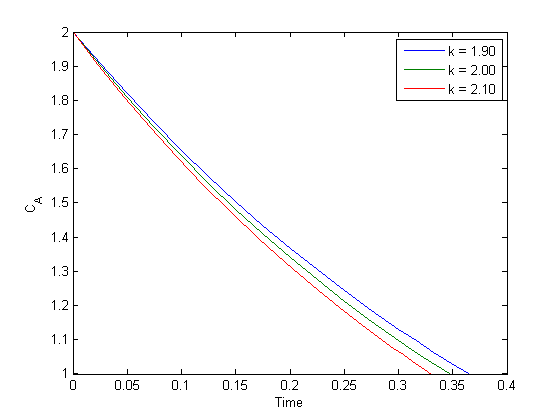Parameterized ODEs
September 16, 2011 at 05:35 PM | categories: odes | View Comments
Parameterized ODEs
John Kitchin
Sometimes we have an ODE that depends on a parameter, and we want to solve the ODE for several parameter values. It is inconvenient to write an ode function for each parameter case. Here we examine a convenient way to solve this problem. We consider the following ODE:
Contents

where  is a parameter, and we want to solve the equation for a couple of values of
is a parameter, and we want to solve the equation for a couple of values of  to test the sensitivity of the solution on the parameter. Our question is, given
to test the sensitivity of the solution on the parameter. Our question is, given  , how long does it take to get
, how long does it take to get  , and how sensitive is the answer to small variations in
, and how sensitive is the answer to small variations in  ?
?
function main
clear all; close all; clc ko = 2; tspan = [0 1]; % you need to make sure this time span contains the solution! Cao = 2;
finding the solution
we will use an events function to make the integration stop where we want it to. First we create an options variable for our ode solver to use the event function to stop integrating at Ca = 1
options = odeset('Events',@event_function);
we will look at +- 5% of the given k-value
ktest = [0.95*ko ko 1.05*ko] results = [];
ktest =
1.9000 2.0000 2.1000
this syntax loops through each value in ktest, setting the kvar variable equal to that value inside the loop.
for kvar = ktest % make a function handle using the k for this iteration f = @(t,Ca) myode(t,Ca,kvar); [t,Ca,TE,VE] = ode45(f, tspan, Cao,options); % TE is the time at which Ca = 1 results = [results TE] % store time for later analysis plot(t,Ca,'displayname',sprintf('k = %1.2f',kvar)) hold all end legend('-DynamicLegend') xlabel('Time') ylabel('C_A')
results =
0.3648
results =
0.3648 0.3466
results =
0.3648 0.3466 0.3301

sprintf('k = %1.2f: Ca = 1 at %1.2f time units\n',[ktest;results])
ans = k = 1.90: Ca = 1 at 0.36 time units k = 2.00: Ca = 1 at 0.35 time units k = 2.10: Ca = 1 at 0.33 time units
compute errors
we can compute a percent difference for each variation. We assume that ko is the reference point
em = (results(1) - results(2))/results(2)*100 ep = (results(3) - results(2))/results(2)*100 % We see roughly +-5% error for a 5% variation in the parameter. You % would have to apply some engineering judgement to determine if that % is sufficiently accurate.
em =
5.2632
ep =
-4.7619
function dCadt = myode(t,Ca,k) dCadt = -k*Ca; function [value,isterminal,direction] = event_function(t,Ca) value = Ca - 1.0; % when value = 0, an event is triggered isterminal = 1; % terminate after the first event direction = 0; % get all the zeros % categories: ODEs % tags: reaction engineering